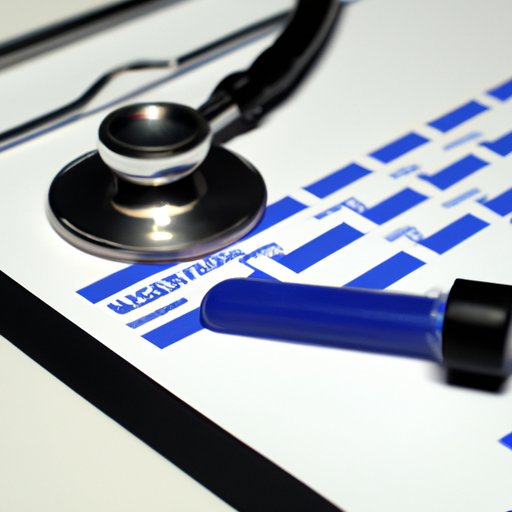
Health Screening: Everything You Need to Know
Regular health screening is an integral part of maintaining overall health and wellness. By detecting potential health issues early, screenings can help prevent more serious health problems from developing. In this article, we will discuss the basics of health screening, real-life examples of its benefits, its history and technological advances, the pros and cons of getting screened, and common questions and concerns.
What is Health Screening and Why is it Important?
Health screening is a preventative measure that involves testing for potential health issues before they show any symptoms. It can include everything from blood tests and cholesterol screenings to full-body scans and X-rays. Getting screened early and regularly can help catch health issues early, allowing for prompt treatment and better health outcomes.
Overview of Commonly Used Screening Tests
Common screening tests include blood pressure checks, cholesterol tests, cancer screenings, and diabetes screenings. These tests are used to help identify potential health problems before they progress and become more serious.
Who Should Get Screened and When?
The recommended health screenings can differ depending on your age, gender, and medical history. It’s important to talk to your doctor about which screenings are best for you and how often you should receive them. Typically, adults over the age of 50 are encouraged to get screened for colon cancer, women over the age of 40 should receive mammograms, and men over the age of 50 should receive prostate cancer screenings.
The Importance of Regular Screenings for Maintaining Good Health
Regular health screenings are crucial for maintaining good health and preventing more serious health issues from developing. By staying up-to-date on your screenings and addressing any health issues early, you can take control of your health and achieve better health outcomes in the long run.
Real-Life Examples of the Benefits of Health Screening
There are countless examples of individuals who have benefited from health screenings. For example, a woman in her early 50s received a mammogram that detected early-stage breast cancer. After receiving treatment, she has been cancer-free for over 5 years. A man in his 60s received regular colon cancer screenings, which helped detect a tumor before it developed into colon cancer. He was able to receive treatment early and is now in good health.
Healthcare professionals stress the importance of regular screenings and early detection. In fact, according to the American Cancer Society, early detection has been linked to higher survival rates for a variety of cancers.
The History and Future of Health Screening
The practice of health screening dates back to ancient Greece, where it was used to detect potential health issues in soldiers. Over time, the practice has become more sophisticated, incorporating technological advances like blood tests, X-rays, and MRI scans. In the future, experts predict that health screenings may become even more personalized, focusing on individualized needs and genetic indicators.
The Pros and Cons of Health Screening
The Downside of Health Screening
While health screening is an important preventative measure, it’s not without its downsides. False positives can lead to unnecessary anxiety and testing, while false negatives can lead to undetected health issues. Some may also argue that over-screening can lead to over-diagnosis and over-treatment, which can be harmful.
The Benefits of Health Screening
Despite the downsides, there are many benefits to health screening. By catching potential health issues early, screenings can help prevent more serious health problems from developing. They can also provide peace of mind to those who may be worried about their health and help individuals take control of their health and wellness.
How to Balance the Risks versus Benefits of Health Screening
It’s important to balance the risks versus benefits of health screening. While getting screened early and regularly can help catch potential health issues early, it’s also important to be mindful of the potential downsides. Talking to your healthcare provider and weighing the pros and cons can help you make informed decisions about your health.
Common Questions and Concerns About Health Screening
What Tests Are Recommended for Different Age Groups?
The recommended health screenings can differ depending on your age, gender, and medical history. It’s important to talk to your doctor about which screenings are best for you and how often you should receive them. Typically, adults over the age of 50 are encouraged to get screened for colon cancer, women over the age of 40 should receive mammograms, and men over the age of 50 should receive prostate cancer screenings.
How Often Should People Be Getting Screened?
The recommended frequency of screenings can vary depending on your age, medical history, and risk factors. It’s important to talk to your healthcare provider about which screenings are best for you and how often you should receive them.
Potential Risks or Downsides Associated with Testing
There are some potential risks associated with health testing, such as false positives, false negatives, and the potential for over-diagnosis and over-treatment.
What to Do if a Screening Test Comes Back Abnormal
If a screening test comes back abnormal, it’s important to talk to your healthcare provider about what the results mean and what you should do next. They may recommend additional testing or treatment, depending on the specific issue.
Conclusion
Regular health screening is an important part of maintaining good health and wellness. By catching potential health issues early, screenings can help prevent more serious health problems from developing. We encourage readers to talk to their healthcare provider about which screenings are best for them and how often they should receive them.




